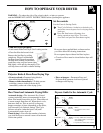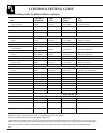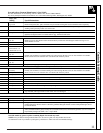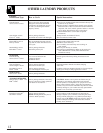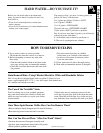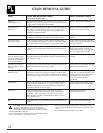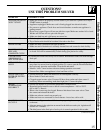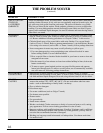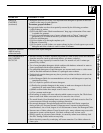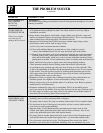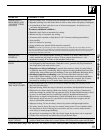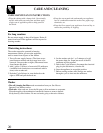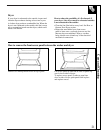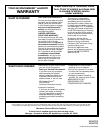
PROBLEM POSSIBLE CAUSE
GRAYED • Detergent dissolves too slowly. It is important that detergent be present in the wash
CLOTHES solution at the start of wash agitation.
(continued)
To restore grayed clothes—
Most grayed clothes can be at least partially restored by the following procedure:
(a) Put clothes in washer.
(b)Fill with HOT water. Check manufacturers’ hang tags to determine if hot water
is suitable for garment.
(c) Add a non-precipitating type of water softener such as Calgon
™
brand with
phosphate. Use 2
1
⁄2 times as much as you need for normal water softening.
(d)Do not add detergent.
(e) Allow clothes to go through complete cycle.
(f) Repeat, if necessary.
(g)If you prefer to soak clothes, use water softener in place of soak agent or pre-wash
detergent and allow clothes to soak for about 20 minutes.
HEAVILY SOILED • Pretreat with liquid detergent.
AREAS such as
collars and cuffs
LINT OR RESIDUE • Incorrect sorting of clothes. Separate lint-producers (such as terry towels and chenille)
ON CLOTHES from lint-receivers (such as man-made fabrics, velveteen, corduroy).
IN CYCLE
• Washing too long, especially for smaller loads. For normal soil, use 1 minute per
pound of dry clothes.
• Use of non-phosphate detergents which combine with hardness minerals in water to
form a precipitate which can be mistaken for lint.
• Use phosphate detergent or liquid detergent; use warmer wash water or soften water
with an installed mechanical softener or a packaged water softener.
• Undissolved granular detergent may leave powdery residue on fabrics which can be
mistaken for lint.
(a) See Detergent Guide for recommendations on how to add detergent to speed up
complete dissolving.
(b) Use a liquid or special cold water detergent.
(c) Predissolve granular detergent in hot water, or make sure detergent is dissolved
completely in wash water before adding clothes.
(d)Make certain clothes have ample room to move in washer.
(e) Use a warmer wash water.
• Overloading of washer will cause abrasion which creates excessive lint. Wash fewer
items in each load. Make sure water level is correct for size of load.
• Too much bleach. Over-bleached items, such as towels, will shed excessive lint. Use
correct amount of bleach according to package directions.
• Not enough detergent. Enough detergent must be used to hold lint in suspension
during wash cycle. Increase amount of detergent used. Amount is determined by
water hardness, size of load, degree of soil and amount of water. See Detergent Guide.
• Incorrect use of fabric softener. If used in wash cycle, many softeners may react with
detergent to create a white deposit. Use fabric softeners only in rinse cycle.
• Pilling, usually on polyester-cotton blends, is caused by normal wear and may look
like lint. Turning clothes inside out may help.
• Static electricity caused by overdrying will cause attraction. Use fabric softener in
rinse cycle.
(continued next page)
The Problem Solver
17



